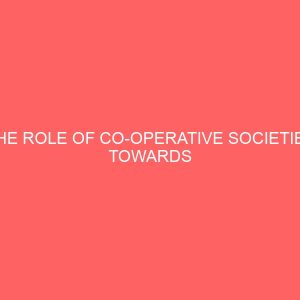Description
CHAPTER ONE
1.0 INTRODUCTION
The Nigerian economy is currently supported by oil, which is the major nonrenewable energy source. ICTs play an important role in increasing productivity and efficiency in many sectors of the economy. With the expectation of high oil prices, the question arises as to whether increased production and more equitable distribution of useful oil and gas energy resources are possible, through the use of modern ICTs. This applies mostly to developing countries like Nigeria. Oil exporting countries try to maximize the advantages of using ICTs, while oil importing countries are interested in using oil and gas more effectively. Thus, determining the impact of ICTs in the oil and gas sector can be used to better access the future economic development of developing countries. ICTs provide a means to improve both upstream operations crude oil production and exploration and downstream operations transportation, refining of crudeoil and distribution of oil products.
Oil companies in particular adopt ICTs to improve the efficiency and effectiveness of their operations, as well as to aid management decision making. This helps to strenghten their competitive positions in rapidly changing environments. Environmental, organizational, and technological factors are creating a highly competitive business environment in which customers are the focal point. Furthermore, these factors can change very quickly. Thus, the growth of any company is tied to retaining loyal customers, improving productivity, reducing costs, increasing market share, and providing timely organizational response. ICT is a major tool for dealing with these issues. Due to the degree of uncertainty in todays competitive oil industry, oil companies in Nigeria are operating under increasing pressures to produce more with minimum resources. In order to succee in this dynamic environment, oil companies must undertake innovative activities such as improving operational processes and continuously reviewing competitive strategies. ICT has a high impact in oil and gas operations. For example, in upstream operations ICTs and related technologies may provide possibilities for expanding proven crude oil reserves, improving the rate of crudeoil extraction from existing wells, and providing further means to discover new wells.
1.1 BACKGROUND TO THE STUDY
BRIEF HISTORY OF SHELL
Oil prospective began in Nigeria as Farback as 1908 when a German company the Nigerian as Bitumen corporation started exploration in Araomi Area of the present Ondo State their preening effort however ended with out break of the first would war 1914 in 1937 oil prospective resumed in Nigeria shell B.P was awarded the sole right covering the whole territory of Nigeria the activities were gain interrupted by the second world war but resumed in 1947 however it was not until 1958 that oil was discovered in commercial quantities at Olobier mean port Harcourt River State after several years of search and an investment of our N30 million.
By 1961 other companies including chevron Nigeria Ltd had began exploration activities for oil in the on share and of shore area of Nigeria the exploration right which had formerly been granted to shell alone was now extended to the other companies in the line with the governments policy of increasing the pace of exploration in the country.
1.2 STATEMENT OF THE PROBLEM
Information and Communication Technology has become a potential tool in every business organisational sustainable growth it has revolutionized the oil and gas industry and its advent has enormously increased the capabilities of oil industry as they are now able to offer wider range of services to the customers. Despite all these innovations in the industry, it is highly disheartening to observe that shells and Chevron are still finding it difficult to meet the expectations of their customers as regards service delivery and operation. It is not uncommon to find common errors in measurements and long queues in, delay in attending to customers, inability to properly sort out transaction and customers general loss of trust in them.
These has therefore led to the interest of the researcher to examine the impact of Information and Communication Technology ICT on Nigerian Oil and Gas Industries performance and also to realise the significant impact ICT has had on their operations so as to guarantee their profitability and growth.
1.3 OBJECTIVES OF THE STUDY
The broad objective of this study is to identify the impact of Information and Communication Technology on the performance of some selected oil amp; Gas industry in Nigerian. The specific objectives of the study are;
1. To determine if ICT has enhanced the profitability of Nigerian Oil and gas Company.
2. To know if ICT has grown/ increased the assets base of Nigerian Oil and gas Company.
3. To determine if ICT has enhanced the liquidity of Nigerian Oil and gas Company.
4.To determine if ICT has improved the service delivery of Nigerian Oil and gas Company.
1.4 RESEARCH QUESTIONS
In the light of the preceding objectives, the study seeks to answer he following questions
1. Has ICT enhanced the profitability of Nigerian Stabilizer
2.What is the extent of application of Information and Communication Technologies in Oil amp; Gas Use
3.Do the Oil amp; Gas make use of these modern Information and Communication Technologies in reporting
4. Has ICT grown/ increased the assets base of Nigerian Stabilizer
5. Has ICT enhanced the liquidity of Nigerian Stabilizer
6. Has ICT improved the services rendered by Nigerian Stabilizer
1.5 SIGNIFICANCE OF THE STUDY
Every organization is concerned with the best possible way of improving performance to guarantee sustainable growth that will lead to the achievement of organizational goals. Therefore, the knowledge that would be obtained from this research will assist management of Oil amp; Gas Company to appreciate the importance and use of ICT products to achieve overall efficiency and effectiveness in their operations. This study will also benefit financial institutions in general, as it will provide the framework with which proper system upgrade scan be carried out together with the adoption of computer to guarantee efficient service delivery, maximization of profit and minimization of cost. Students of management sciences and other researchers who intend to carry out further studies will find this study as a useful reference material especially in their literature review and findings thereby helping to arrive at objective conclusions. Finally, it is hoped that the conclusions arrived at, will assist business organisations in ICT application so as meet desired organisational goals and objectives.








Reviews
There are no reviews yet.